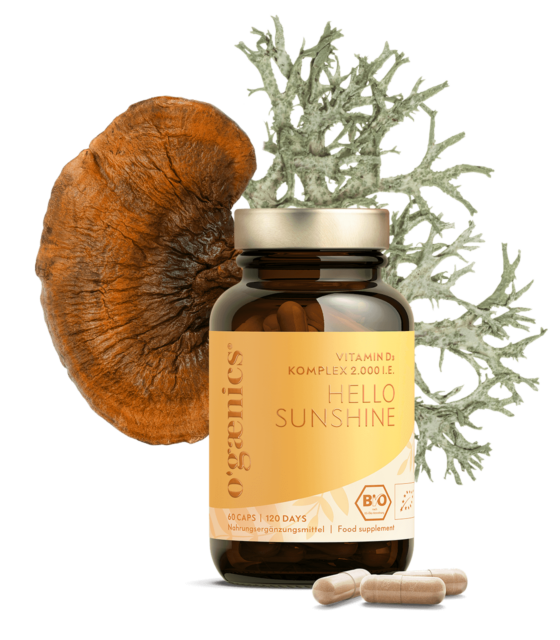IN THIS ARTICLE
How hormonal acne occurs and how to naturally get back to your skin balance.
What is hormonal acne?
Hormonal acne is a form of acne caused by hormonal fluctuations. Especially in women, an excess of estrogen can lead to an imbalance of hormones and cause acne. Typical phases in which hormonal acne develops are therefore
- during puberty
- around menstruation
- after stopping the pill
- During pregnancy
- in menopause
What hormone triggers acne?
Hormonal acne is caused by an overproduction of androgens. Androgens are male hormones that are also produced by women, but in smaller amounts. When androgens are overproduced, this can lead to an increase in sebum production in the skin pores, which ultimately leads to the development of acne.
The hormone most associated with the development of acne is testosterone. When testosterone is elevated in the body, it can lead to an overproduction of sebum, which in turn gets stuck in the skin pores and leads to acne. However, it is important to note that testosterone is generally not a “bad” hormone for women. In fact, women actually need the “male” hormone. You can read more about this in our article“Testosterone: Why it is as important for women as it is for men”.
In addition to testosterone, other hormones such as DHEA-S (dehydroepiandrosterone sulfate) and insulin-like growth factor 1 (IGF-1) can contribute to the development of acne. DHEA-S is produced by the adrenal glands and, when produced in excessive amounts, can increase sebum production. IGF-1 is a growth hormone that can also stimulate sebum production.
It is important to note that hormone imbalances are not always the sole cause of acne. The hormonal imbalance may also have deeper causes. For example, a weakened liver can contribute to hormone metabolism no longer being in balance. In this case, it would be important to strengthen the liver. You can read how this works and how you can recognize a weakened liver in our article “Tired all the time? Maybe your liver is whispering for help”.
Other factors such as stress, diet and genetic predisposition can also contribute to the development of acne. A comprehensive diagnosis and treatment by a dermatologist is therefore the best way to treat hormonal acne and prevent it in the future.
How to recognize hormonal acne
Surely you are now wondering how you can tell if the blemishes you are struggling with are hormonal acne. Now, aside from the fact that you should definitely see a dermatologist for any form of acne, there are some typical signs that your breakouts could be hormonal acne:
- Outbreaks in the chin and jaw area
- Deep, painful pimples
- Skin blemishes before menstruation
- Acne that does not respond to conventional treatments
- Increased sebum production
- Mood swings and other hormonal changes
Hormonal acne: what you should not eat
Hormonal acne can be influenced by a variety of factors, including diet. Certain foods can affect hormone production and promote the development of acne. Therefore, it is important to follow a balanced and healthy diet rich in fruits, vegetables, whole grains and lean proteins.
Dietary changes alone may not be enough to completely eliminate hormonal acne, but they can help reduce symptoms and promote clear skin.
Dairy products
Dairy products can be problematic for hormonal acne because they contain hormones such as estrogen and testosterone, which can increase sebum production in the body. An increase in hormone levels can lead to increased sebum production, which in turn promotes the growth of acne bacteria and can lead to the development of acne.
In addition, dairy products also contain growth hormones, which are intended for the growth and development of calves, but can also act in humans and influence the hormonal imbalance in the body. For this reason, many dermatologists recommend avoiding or at least reducing dairy products in cases of hormonal acne.
Sugary foods
Sugary foods can be problematic in hormonal acne because they can increase insulin levels in the body. Increased insulin levels, in turn, can stimulate sebum production in the body and promote the growth of acne bacteria, which can lead to the development of acne. In addition, sugary foods can also promote inflammation in the body, which can also contribute to the development of acne.
It is important to note that not all types of sugar are created equal, and that complex carbohydrates such as those found in whole grain products are a better option than simple sugars such as those found in candy and soft drinks. For this reason, many dermatologists recommend avoiding or at least reducing sugary foods for hormonal acne.
Processed food
Processed foods can be problematic for hormonal acne because they often contain high amounts of saturated fats and trans fats, which can promote inflammation in the body and increase sebum production. Increased sebum production, in turn, can promote the growth of acne bacteria and contribute to the development of acne. But this is not just about chips and co.
Here are some examples of processed foods that appear to be healthy, but can be a hindrance to hormonal acne:
- Breakfast cereals: Many breakfast cereals contain a lot of sugar and are often highly processed.
- Ready-made salads: Ready-made salads can often contain added preservatives and dressings that are not healthy.
- Meat substitutes: Meat substitutes such as vegan sausages and burgers can often contain many additives and saturated fats.
- Frozen pizza: Frozen pizza is often very high in saturated fat, salt and calories.
- Soups and stews: Many soups and stews contain added salt, preservatives, and often meat, which can also be problematic for hormonal acne
It is therefore important to carefully read the ingredient list of processed foods for hormonal acne and to watch out for hidden additives, sugars and saturated fats. Many dermatologists even recommend avoiding or at least reducing processed foods for hormonal acne and instead following a balanced and healthy diet rich in fruits, vegetables, whole grains and lean proteins.
Soy products
There is evidence that soy products can cause hormonal imbalances in some people, potentially contributing to the exacerbation of hormonal acne. This is because soy products contain so-called phytoestrogens, which are chemically similar to the female sex hormone estrogen and can potentially influence hormone production in the body.
However, the effects of soy products on hormonal acne are different for each individual, and not all people react the same way to soy products. There are also studies that indicate that soy products can actually help reduce acne in some people, as they may have anti-inflammatory properties.
It is important to consider individual intolerances and sensitivities and, if necessary, avoid certain soy products if they are problematic in hormonal acne. However, if you are not sensitive to soy products, they can be enjoyed in moderation as they can also have many health benefits.
These dietary supplements support
There are some natural helpers at Ogaenics that can support your hormone balance and thus have a positive effect on hormonal acne.
B vitamins
B vitamins can help with acne in several ways. Your skin needs B vitamins to regenerate and renew itself, because they provide the energy that all your cells need as fuel. #
Vitamins B5 and B6 are certainly the most important in hormonal acne, as they control the production of sex hormones and contribute to hormonal balance. Thus, they also indirectly act on the overproduction of sebum (the oil that your skin produces and that can cause acne problems).
A study of women with hormonal acne found that taking vitamin B6 reduced the amount of androgens in the body and decreased the severity of acne.
Probiotics
Probiotics do not directly act on the cause of hormonal acne, but they indirectly support the healing process. This is because invading pathogens are fought and rendered harmless in the intestine – including the acne-causing bacterium Propionibacterium acnes or
Cutibacterium
acnes.
Studies have shown that certain strains of bacteria in the intestine are particularly effective against the acne pathogens. These bacterial strains are
- Lactobacillus plantarum PBS067
- Lactobacillus rhamnosus LRH020 and
- Lactobacillus reuteri PBS072
You’ll find these three strains of bacteria in their clinically effective dosage as a dietary supplement in Ogaenics Beauty and the Bs Pure Skin Complex. Plus, Beauty and the Bs also contains all the B vitamins for your hormonal balance.
Vitamin D
There is some evidence that vitamin D may help treat hormonal acne. Vitamin D is an important nutrient for skin health, as it plays an important role in regulating inflammation and wound healing.
A 2016 study showed that vitamin D supplementation led to significant improvement in symptoms in patients with acne. The study found that vitamin D reduces sebum production and has anti-inflammatory effects on the skin.
There is also evidence that vitamin D deficiency may be associated with an increased risk of acne. A 2014 study found that patients with acne tended to have lower blood levels of vitamin D than people without acne. Therefore, if you have hormonal acne, you should definitely have your vitamin D level tested by blood test to detect and treat a possible deficiency.
How long does it take before I see improvement?
It is important to note that your body and skin need time somewhat to readjust, regulate and regenerate. Therefore, you should give your body four to six months and consistently follow all measures during this time to achieve the best results.
It is also important to know that at the beginning of each new routine, so-called “skin purging” may occur. This is a temporary deterioration of the skin caused by the accelerated renewal of skin cells. Due to the accelerated cell division, sebum and impurities are transported to the surface of the skin more quickly, which can lead to a temporary deterioration of the skin’s appearance.
It is important to emphasize that skin purging is not a sign that the product is bad or that it will harm the skin. On the contrary, it is an indication that the product works and the skin cells are activated. If you are affected by skin purging, you should be patient and continue taking the supplement. The skin will regenerate itself after a certain time and the skin texture will improve.
It can also be helpful to avoid aggressive cleansing products during this time to avoid further irritating the skin. However, if the worsening of the skin condition persists over a longer period of time, you should consult a dermatologist.
Conclusion
Hormonal acne is not a fate you just have to accept. By balancing your hormones and taking care of your skin from the inside, you can improve your complexion and feel good again. Above all, it is important to follow a holistic treatment plan and consult a physician. A healthy diet and supplements can help as part of the treatment plan for hormonal acne.
If you want to read more about skin, read also “What skin problems have to do with the intestine”.
B vitamins
Probiotics
Carlomagno F, Pesciaroli C, Cestone E, De Ponti I, Michelotti A, Tursi F. Clinical assessment on the efficacy of a combined treatment targeting subjects with acne-prone skin. Our Dermatol Online. 2022;13(3):240-247.
Michelotti, Angela et al. “Efficacy of a probiotic supplement in patients with atopic dermatitis: a randomized, double-blind, placebo-controlled clinical trial.” European journal of dermatology : EJD vol. 31,2 (2021): 225-232. doi:10.1684/ejd.2021.4019
Vitamin D
Lim, Seul-Ki et al. “Comparison of Vitamin D Levels in Patients with and without Acne: A Case-Control Study Combined with a Randomized Controlled Trial.” PloS one vol. 11,8 e0161162. 25 Aug. 2016, doi:10.1371/journal.pone.0161162
Wang, Meng et al. “Vitamin D status and efficacy of vitamin D supplementation in acne patients: a systematic review and meta-analysis.” Journal of cosmetic dermatology vol. 20,12 (2021): 3802-3807. doi:10.1111/jocd.14057









 No products in the cart.
No products in the cart.